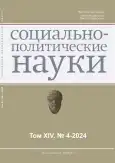Principles of social management as a factor in minimizing political risks in decision making
- Авторлар: Panesh K.M.1
-
Мекемелер:
- State Duma of the Federal Assembly of the Russian Federation
- Шығарылым: Том 14, № 4 (2024)
- Беттер: 78-82
- Бөлім: Political Institutions, Processes and Technologies
- URL: https://bakhtiniada.ru/2223-0092/article/view/279806
- DOI: https://doi.org/10.33693/2223-0092-2024-14-4-78-82
- EDN: https://elibrary.ru/ORUJVC
- ID: 279806
Дәйексөз келтіру
Аннотация
The study draws conclusions from the analysis of the political risks of state power at the present stage of Russia’s development. The socio-political principles of management are analyzed, which are connected and interact with a group of organizational and technological mechanisms of political decision-making, which are integral elements of their common system of public administration. Organizational and technological mechanisms reflect the patterns of social management that are associated with the implementation of its organizational and technical functions and the minimization of political risks. They play an important role in creating the basis for the formation of managerial relations, determining essentially the distribution of power, the degree of centralization of the power of managers and the degree of real independence of the governed. Violation of these principles leads to political risks: unjustified fragmentation of the functions of management bodies, violation of the balance of rights and responsibilities of managers, increased demands on the managed and the unreasonableness of decisions. The peculiarities of personnel policy after the presidential elections of Russia are revealed. Proposals are made on mechanisms of social management based on the principles of social justice, as well as the use of existing potential based on the principles of decision-making and its justification in the context of political risks. The connection between the general picture of the world existing in culture and the way of attitude to the category of power in the public consciousness is substantiated.
Негізгі сөздер
Толық мәтін
##article.viewOnOriginalSite##Авторлар туралы
Kaplan Panesh
State Duma of the Federal Assembly of the Russian Federation
Хат алмасуға жауапты Автор.
Email: panesh_kaplan@mail.ru
SPIN-код: 7735-6661
Cand. Sci. (Econ.); deputy
Ресей, MoscowӘдебиет тізімі
- Bichhvost A.F. The political thought of Antiquity. Part I. Legal Policy and Legal Life. 2010. No. 4. Pp. 70–77. (In Rus.)
- Gaskov D.V. Separation of powers and institutions of power. Bulletin of Science and Education. 2019. No. 11-3 (65). Pp. 60–62. (In Rus.)
- Gevorkyan M.V. The origins of the theory of separation of powers. Bulletin of Pskov State University. Series: Social and Humanitarian Sciences. 2010. No. 11. Pp. 116–120. (In Rus.)
- Dondokov Ts.S., Kuzhikov D.A. The concept of the principle of separation of powers: Historical and legal aspect. Bulletin of ZabGU. 2014. No. 7. Pp. 148–154. (In Rus.)
- Ilyicheva L.E., Parshina E.V. The state and civil society as subjects of social partnership policy. Power. 2024. Vol. 32. No. 2. Pp. 145–159. (In Rus.)
- Kiss S.V. The principle of legality as a fundamental principle of constitutional modernization. Actual Problems of Combating Crimes and Other Offenses. 2024. No. 24. Pp. 344–346. (In Rus.)
- Korobka I.N., Shinkarev A.N. Legal aspects and ways to improve public administration in the field of civil protection. Actual Problems of Modernity. 2022. No. 1 (35). Pp. 17–24. (In Rus.)
- Novoselsky S.O., Moiseeva O.A., Filippova O.A. Communication policy of executive authorities with the population in social networks. Questions of Political Science. 2023. Vol. 13. No. 3 (91). Pp. 1001–1013. (In Rus.)
- Pavlov K.V. Rethinking the Greeks: On the question of the analysis of ancient statehood in the political theory of Niccolo Machiavelli. Studia Humanitatis. 2023. No. 3. P. 10. (In Rus.)
- Safoklov Yu.I. Separation of powers: Fictions and reality the principle of separation of powers: History, misconceptions, challenges of modernity. SKO. 2012. No. 6 (91). (In Rus.)
- Thabisimova L.A. Optimization of the system of state power: The principle of separation of powers. YUP. 2007. No. 1. (In Rus.)
- Zheleznyakov S.S., Podosinnikov E.Yu., Novoselsky S.O. Implementation of state information policy at the municipal level. Innovative Economics: Prospects for Development and Improvement. 2016. No. 7 (17). Pр. 96–106. (In Rus.)
Қосымша файлдар








